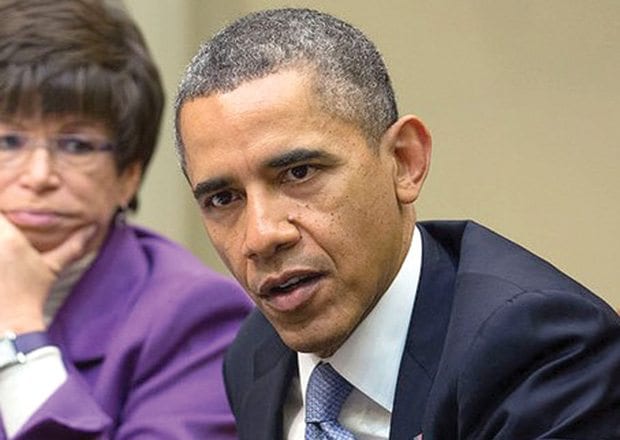

Janet Murguia, president of the National Council of La Raza, recently criticized President Obama for his administration’s deportation policy. Murguia called the president “deporter-in-chief” during a speech to her organization.
The National Council of La Raza had been one of the few remaining Latino advocacy groups to not openly criticize President Obama’s deportation policy. However its president, Janet Murguía, now has turned the lens on the president by calling him “deporter-in-chief” and accusing him of turning a “blind eye” to harm caused by a record number of deportations during his two terms in office.
Murguía called out President Obama during the keynote address at the 2014 NCLR Capital Awards gala in Washington on March 4. She urged him to use executive authority to halt unnecessary deportations.
“Any day now, this administration will reach the 2 million mark for deportations,” said Murguía. “It is a staggering number that far outstrips that of any of his predecessors, and it leaves behind a wake of devastation for families across America. We respectfully disagree with the president on his inability to stop unnecessary deportations. He does have the power to stop this.”
Murguía said that Latino advocates have long been hearing “no” from the White House and from Congress in regards to the ability to stop the deportations.
“We won’t take no for an answer, because we can’t — not while over 400,000 people a year are being deported by this administration. Not while millions continue to live in the shadows, struggling in fear, every single day of their lives, outside the scope and protection of the law,” she said. “Nearly half of those being deported are simply hardworking people who have put down roots in their communities and have employers who count on them. Most have been here more than a decade.
“One out of every four deportees is the parent of a child who is a U.S. citizen. Hundreds of thousands of these children, our children, are being deprived of their mother or father — and very often the family’s only breadwinner. It will take generations to heal the harm caused by inaction. So, yes. We respectfully disagree with the president on his ability to stop unnecessary deportations. He can stop tearing families apart. He can stop throwing communities and businesses into chaos. He can stop turning a blind eye to the harm being done. He does have the power to stop this. Failure to act will be a shameful legacy for his presidency.”
While Murguía’s comments drew attention for her condemnation of the Obama administration, the NCLR was also chastened by some for being too slow to react to a situation that has long bothered the Latino public. For example, a 2012 Pew report found that a quarter of all Latinos in the United States personally knew someone who had been deported and were concerned about the current deportation policy. A Pew report released last month found that 60 percent of Latinos believe the increased deportation numbers — tabbed at 419,384 in 2012 in the same report — were bad.
In her speech to the NCLR, Murguia also called on House leadership to pass immigration reform.
“Only Congress can deliver a broad, inclusive and lasting solution,” Murguía said. “So, to the House of Representatives, we say take up reform now, or suffer the political consequences. There is no excuse not to. Reform will add more than a trillion dollars of economic growth, and billions more in wage increases and tax revenues. You have had more than enough time to come up with legislation to move reform forward.
“It is about ending the pain and suffering of millions of real people. It is about ending a patchwork of laws where even native-born U.S. citizens are at risk of arrest and detention. It is about ending a broken immigration system that ill-serves every sector of our society.”
Murguía is far from alone in her appeal to Congress.
On March 6, two days after the NCLR took a stand against President Obama’s deportation policy, more than 200 hundred leaders from Latino nonprofit and civic organizations from cities across the U.S. traveled to Capitol Hill to send a strong message to House Republican leadership that failing to act on immigration reform will have political consequences.
Part of the 2014 NCLR National Latino Advocacy Days, which brought hundreds of Latino leaders from more than 30 states to Washington for training on policy and legislative advocacy, the visit to the House targeted the office of Majority Leader Eric Cantor, R-Va.
“House Republican leadership has hidden behind excuse after excuse for why they cannot move forward with immigration reform,” said Clarissa Martínez-De-Castro, director of immigration and civic engagement at NCLR. “Political choices have consequences, and how they handle immigration reform in the next ten months will impact the political landscape over the next decade. Latinos won’t sit idly by while thousands more family members and friends get deported every day. Our community will continue to pressure House Republicans to act and the White House to intervene in unnecessary deportations. We will raise our voice at the voting booth, where we will remember who championed immigration reform and who stood in the way of progress.”
Latino advocates emphasize the growing power of the community’s vote as fuel for swaying political opinion on immigration reform. More than 11 million Latinos cast a ballot in the 2012 elections. The Hispanic vote grew by 15 percent between 2008 and 2012 — compared to 10 percent for black voters and 2 percent for white voters — and that growth is expected to continue as an average of 880,000 young Latino citizens turn 18 each year and become eligible to register to vote.






